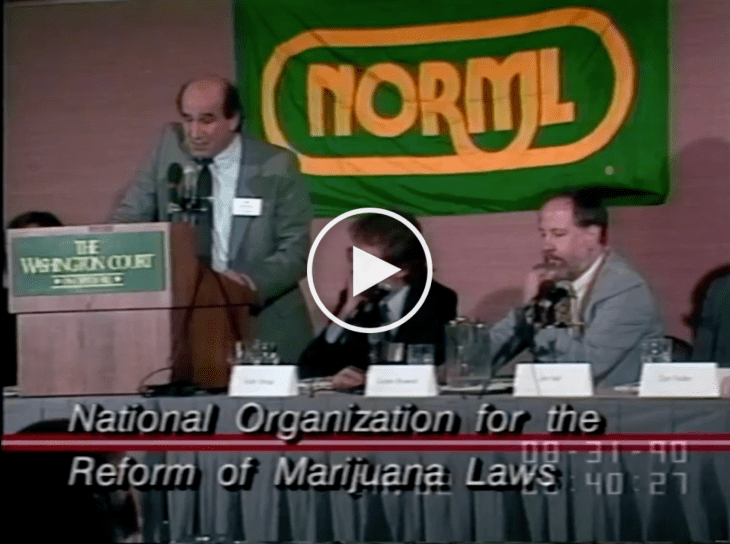
NORML Founder Keith Stroup
For NORML’s 50th anniversary, every Friday we will be posting a blog from NORML’s Founder Keith Stroup as he reflects back on a lifetime as America’s foremost marijuana smoker and legalization advocate. This is the eighteenth in a series of blogs on the history of NORML and the legalization movement.
There have been many dedicated activists who have contributed significantly to our efforts to end marijuana prohibition over the last five decades. I want to focus this week on a couple of the folks who played a crucial role during the 1970s – Richard Wolfe from Ohio and Gordon Brownell from California.
Richard M. Wolfe
Of the eleven states that adopted a version of marijuana decriminalization in the 1970s, following the release of the report of the Marijuana Commission in 1972, the state of Ohio was certainly one of the most unexpected. Ohio has long been considered a conservative state politically and their drug policies have reflected that bias, with harsh mandatory minimum penalties for drug offenses.
Few elected officials in Ohio during those years would have been comfortable working openly with NORML. It would have provided their political opponent in the next election with an easy line of attack, but it turns out we had a secret weapon – a rich young Republican by the name of Richard M. Wolfe. Richard was a graduate with an electrical engineering degree from Ohio State and a business degree from the Harvard Business School, who would later become a member of the NORML Board of Directors.
Wolfe, having first read about NORML in Playboy Magazine, had contacted the organization for support and advice regarding how best to proceed. I was delighted to learn that he was interested in helping us introduce the concept of marijuana decriminalization to members of the Ohio legislature. Frankly, at the time I presumed this would be an investment that might pay off in a few years, but I certainly did not expect we could possibly win legislative approval for decriminalization with our initial attempt. In hindsight, I did not fully appreciate the political clout of having the Wolfe family behind our efforts. The Wolfe family support, because of their conservative reputation, provided political cover for those willing to try this new approach being advanced by the National Commission on Marijuana and Drug Abuse.
The Wolfe family owned a number of major media outlets, including the Columbus Dispatch newspaper and television stations in Columbus and Indianapolis, as well as a number of midwestern radio stations and other corporate interests. Most importantly, they were a powerful, conservative Republican family with close ties to the legislature.
When the legislature was considering a get-tough drug bill modeled after the infamous New York Rockefeller law, Wolfe managed to get some of the worst provisions trimmed-back while also getting a marijuana decriminalization provision added to the bill.
Most importantly, when the key legislative hearings were scheduled, Richard Wolfe sent his family jet to California to bring back then-popular television personality Art Linkletter to support the decriminalization provisions.
In a highly publicized case some years earlier, Linkletter’s daughter had jumped—or fallen—to her death from a balcony while on an LSD trip and he was thought to be a strongly anti-drug zealot. Honestly, for a time, he probably was. Wolfe, who had met Linkletter at a Young Presidents Organization convention, knew that his thinking had evolved and he no longer believed in locking people up for drug use. When Linkletter testified in Ohio he told legislators, “I’m soft on people, not soft on drugs.” His support was both newsworthy and politically powerful.
Richard Wolfe speaks in favor of medical cannabis in Ohio, October 16, 2010
The measure, which decriminalized up to one hundred grams of pot (three and a half ounces) was passed with a voice vote in the senate. The voice vote provided political cover for senators who might have been hesitant to be publicly associated with marijuana allowing individual senators to keep their support of decriminalization “off the record” from potential political opponents.It was signed into law as the country’s most liberal marijuana law at that time.
Wolfe subsequently moved to the west coast where he split his time between his homes in San Francisco and Los Angeles and a vacation home on Ibiza, an island off the coast of Spain. For several years prior to his retirement, he served as president of Hi-Vision America, an HDTV consulting firm.
Richard served on the NORML board from 1999 through 2013 and remained a key supporter over many years, both financially and politically. Without question, without the active support of Richard Wolfe and the standing of the Wolfe family, Ohio would not have adopted marijuana decriminalization in 1977.
Gordon Brownell – West Coast NORML Coordinator
Due to the popularity of marijuana in California, it was one of the states we had targeted following the release of the Marijuana Commission report. We knew from polling that marijuana decriminalization was popular In California, but we soon discovered the legislators were still fearful of being seen as “pro-pot.”
Our ace in the hole was State Senate Majority Leader George Moscone, a popular progressive legislator who later became mayor of San Francisco, and who was sadly assassinated along with San Francisco Supervisor Harvey Milk by a deranged former right-wing supervisor. While our decriminalization bill was pending in the state legislature, Moscone, our primary sponsor in the senate, took us under his wing. He invited West Coast NORML director Gordon Brownell to work out of his office, where he gave us a desk and a phone, and allowed us to run our lobbying efforts from his suite.
Needless to say, working under the tutelage of the most powerful member of the state legislature was a considerable advantage that few fringe public-interest lobbies enjoyed. Big business does this all the time in legislatures all across America, including Congress, but our side rarely had such inside access.
Following his graduation from Fordham Law School, Gordon Brownell worked for the Nixon campaign in New York in 1968 and was rewarded with a job in the Nixon White House, working as an assistant to Harry Dent, one of Nixon’s top political advisers. In 1970, he worked for the Reagan re-election campaign in California, and subsequently for conservative writer Kevin Phillips, before an experience with mescaline convinced him that his appreciation for personal freedom put him at odds with his Republican benefactors. He subsequently redirected his politics and joined the fight to legalize marijuana, first as political director for Amorphia, and then when Amorphia merged with NORML as NORML’s west coast coordinator.
Brownell became a key player in the months that the decriminalization bill was pending in the California legislature and he had the full trust and confidence of Senator Moscone. The campaign seemed to be derailed on more than one occasion, but each time Brownell and Moscone devised a fallback strategy and the proposal was resurrected. At one point we had the Drug Abuse Council conduct another survey of voters, this time in California, and DAC head Dr. Tom Bryant testified that the proposal was popular with voters, and that elected officials had nothing to fear from supporting it.

C-SPAN: Gordon Brownell on the History of NORML, August 30, 1990
On another occasion we brought in Representatives Kafoury and Hansel from Oregon, the principal sponsors of their first-in-the-nation decriminalization law, to attest to the success of the Oregon law, and we finally picked up the needed votes. Then-Governor Jerry Brown, who in 2010 was once again elected governor of California, had said he would sign the bill, if it was approved by the legislature. The legislature finally approved the Moscone bill in July of 1975 and the governor kept his word.
It was a long, hard fight, but California was finally a “decriminalization” state. In fact, the compromise to win final approval included an amendment that left the offense classified as a fine-only, minor misdemeanor, with no arrest or possibility of jail. Nonetheless,it was still technically a misdemeanor, and therefore left one with a criminal record. Only in 2011 did we finally convince the California legislature to reclassify a minor possession offense as a civil infraction carrying a hundred dollar fine, thereby eliminating the need to make a court appearance and avoiding a criminal record altogether. And, of course, in 2016 California voters approved an initiative to fully legalize the adult use of marijuana.
Brownell served as the Chair of the NORML Board of Directors from 1981 to 1985. He is now retired and lives with his wife in northern California.










